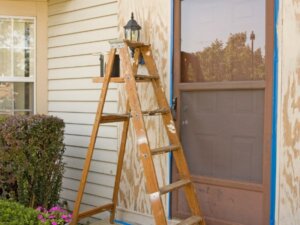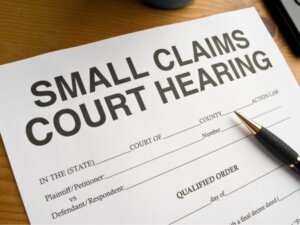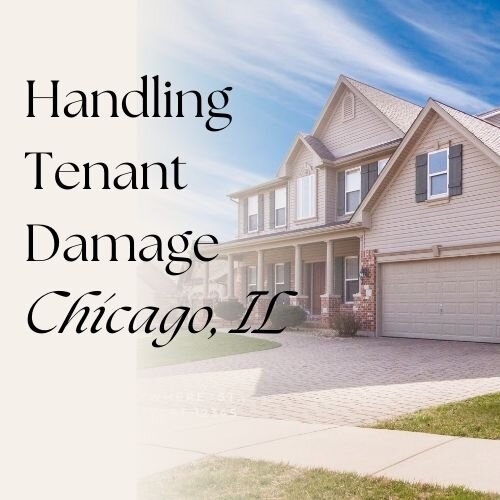
Legal Framework for Tenant Responsibilities in Illinois Rental Agreements
The Illinois Landlord and Tenant Act and Chicago Residential Landlord and Tenant Ordinance (RLTO) are the principal Illinois apartment rental legislation. Tenants must keep their rental homes clean and free of damage beyond normal wear and tear. The RLTO requires tenants to notify owners of repairs to prevent further damage. Tenants must repair any damage they or their guests make, whether intentional or not.
If you break these restrictions, you could lose your security deposit or be evicted. The rental agreement may also specify how the renter must maintain the property. Both landlords and tenants in Chicago should read these contracts carefully before signing.
Knowing these standards helps landlords and renters communicate openly and fairly, improving city rental property management.
Understanding Tenant Damage Liability in Chicago, IL Rental Properties
Chicago landlords and renters must know who is accountable for rental home damage. Local landlord-tenant rules require the ability to distinguish between regular wear and tear and property damage. Normal wear and tear includes faded paint and stained rugs. Tenant damage is more significant and caused by neglect or overuse. The list includes shattered appliances, windows, and holes in walls.
Most tenants are liable for mending or paying for damage beyond normal wear and tear. Before renters move in, landlords must inspect and photograph the property to document its condition. If there are disputes over using the security deposit for lease-end repairs, this form helps you determine who is accountable. Discuss who is accountable for maintenance and fix any issues immediately to avoid costly repairs or court.
The landlord and renter should know these duties to obey the agreement and maintain the property.
Common Types of Property Damage Caused by Tenants
Chicago landlords and renters face various rental housing damage issues. Drinks and cigarettes can discolor and burn carpets, making repairs expensive. Moving or hanging furniture carelessly can leave holes and scrapes on walls. Used or well-maintained kitchen items can break down, such as handles that don’t work or units without handles.
Bathroom fixtures can leak or mold if they don’t get enough airflow or are neglected. Pets and heavy foot traffic can harm wooden flooring if not protected. Broken locks or glass may harm windows and doors. These would reduce house safety and cost the owners more to fix. Knowing these frequent tenant damage can help Chicago landlords and tenants manage their properties.
Understanding Wear and Tear Vs. Actual Property Damage

Chicago, IL homeowners and renters must distinguish between natural wear and tear and property damage. Standard wear and tear is regular use damage. This could be faded paint, broken carpet, or minor wood floor scratches. Rental units often have these issues, and the owner frequently addresses them.
Renters who shatter windows, make huge holes in walls, or stain carpets so badly that ordinary cleaning can’t fix them damage the property. Determine who is accountable and return everyone’s security fee by understanding these variances. In Chicago’s competitive rental market, everyone should know what they want upfront. This prevents arguments over roommate damage against normal wear and tear. In cases where the damage is extensive and repair costs outweigh the benefits of keeping the property, selling might be the most practical choice. Working with A Team Real Estate Solutions who is a Chicago cash home buyer allows you to sell your rental property as-is, without the need for repairs or tenant removal. Our House buying Process can save you time, eliminate stress, and help you recover funds quickly so you can reinvest in more profitable opportunities.
Landlord Rights and Responsibilities Regarding Tenant Damage
Chicago tenants have rights and duties for damage. They must know these rights to maintain a fair and legal relationship. Most landlords can trust their tenants to maintain the property and respect the agreement. If a tenant breaks something unusual, the landlord can charge for repair or replacement.
Some or all of the security deposit may be returned if damage is proven. Under Illinois law, the landlord must give the tenant a complete report of the security deposit deductions for damage within 30 days of the renter leaving. Landlords must also act. They must verify that damage claims are not just wear and tear from heavy use. They must thoroughly examine before and after renters move in or out and record photos or written reports with dates to document any issues.
By making their expectations explicit in thorough lease agreements and communicating with renters about maintenance issues, landlords can improve living conditions and prevent disputes over damage and property condition.
The Role of Security Deposits in Covering Rental Property Damages
Security deposits help keep Chicago rental houses in good condition and reduce damage. These deposits protect landlords by covering tenant damage beyond typical wear and tear for repairs and cleaning. People renting apartments must understand security deposits because they demonstrate their responsibility for the property. Chicago regulations govern security deposit treatment. Like keeping them in separate accounts and giving tenants receipts.
The owner must thoroughly check for issues when a tenant’s lease expires. You have a limited time to give the landlord a complete list of repairs before they deduct the security deposit. This strategy ensures transparency and fairness for both parties. Landlords must observe security deposit rules to avoid legal complications and properly address property damage. Renters should photograph their unit before and after moving out to protect their deposit from bogus claims.
Effective Lease Clauses to Mitigate Risk of Property Damage
Chicago renters and homeowners must create good lease agreements to minimize property damage. A decent lease agreement should state the tenant’s responsibility for repairs and upkeep, as well as damage and natural wear and tear. It should also cover damage reporting. Specifics concerning security deposits can assist customers comprehend what will happen with the money if the property is damaged. You can also require renter’s insurance. Accidental damage can be covered.
People may avoid costly repairs if the rental unit has clear restrictions about what can and cannot be changed. If these are in the lease, all parties may be confident the rental property stays in good condition and everyone is held accountable. A cash house buyer in Evergreen Park can purchase the property as-is, meaning the landlord doesn’t have to repair or renovate before selling.
Strategies for Preventing Tenant-caused Property Damage
Chicago landlords should create a comprehensive plan to prevent tenant harm. This should involve thorough tenant screening, explicit lease terms, and frequent property inspections. Checking names and backgrounds may help you select good tenants who won’t cause damage. A good lease should tell tenants what to do to maintain the property and what will happen if they damage it beyond regular wear and tear. You can also notify your landlord of issues to prevent them from worsening.
Regular inspections help landlords monitor the property’s condition and ensure renters are taking care of it. Teaching tenants how to maintain the rental will increase safety. Offering renters incentives for house maintenance may help make them care about their home. If landlords follow these procedures, renters are less likely to harm the property. This benefits landlord-tenant relations.
The Impact of Tenant Screening on Reducing Potential Damages
Screening tenants is crucial for Chicago, IL rental property safety. Rent histories, credit scores, and eviction records can help landlords make good judgments. You can screen tenants to discover ones who will be responsible, maintain the property, and follow the lease. A busy city like Chicago has high rental demand. Make sure tenants have a history of on-time rent and property maintenance to reduce harm.
Tenant screening can also reveal prior neglect or malfeasance, which may indicate future issues. Landlords can maintain rental flats and develop confidence and responsibility with tenants by screening applicants thoroughly. By include renter screening in the lease process, Chicago renters can protect their money and stabilize the rental market.
Educating Tenants About Their Liability and Maintenance Responsibilities
To maintain the rental agreement amicable, Chicago, IL landlords and renters must teach tenants about maintenance and legal responsibilities. Owners should inform tenants of their damage and upkeep expectations at the start of the lease. Any damage beyond regular wear and tear is the tenants’ responsibility. This includes shattered tools and wall holes from improper use. Tenants should be given explicit instructions on how to clean the HVAC system’s filters and report small issues immediately to prevent larger issues.
Landlords may preserve their investment and make tenants more responsible for their home by fostering tenant communication. Additionally, showing tenants Chicago rental property rules ensures compliance and improves landlord-tenant relations. In cases where cooperation fails, understanding effective strategies for removing bad tenants becomes essential to protect the property and restore stability.
Insurance Options for Landlords to Cover Tenant-related Damages
Chicago landlords can purchase various renter-related insurance policies. They feel secure with their money. Most rental insurance policies cover renter-caused property damage, including intentional or accidental damage. These guidelines can be endorsed to cover renter-caused issues like water damage from faulty pipes or fire damage from carelessness. Liability insurance protects renters against litigation if guests or tenants are injured on the property.
Some insurance companies pay owners for missed rent if renters damage the property so much it can’t be lived in. Chicago renters should examine their policies and consider adding riders to protect them from home rental risks. A good insurance agent can help you secure a thorough landlord policy that covers various tenant concerns.
Steps to Take When Discovering Extensive Property Damage by Tenants
Chicago, IL landlords must act promptly and wisely when their tenants damage their property. First, tenants should photograph and document each damaged area. This information is crucial for court or insurance claims. Next, landlords should review the lease agreement to understand their rights and duties when renters damage the property.
You should also contact the tenant immediately. This conversation should address the harm, who may be accountable, and alternative solutions like fixing things or giving money. Illinois landlord-tenant rules require landlords and renters to engage a mediator or go to court if they can’t resolve their dispute. Telling your insurance company about the damage will help them decide if they will pay to fix it. Insurance doesn’t always cover everything, and claims can take time A cash house buyer in Illinois can purchase the property as-is, meaning the landlord doesn’t have to repair or renovate before selling. Landlords may quickly and effectively repair rental homes by following these guidelines.
Assessing and Documenting Tenant-induced Property Damage
In Chicago, IL, landlords and renters must inspect and document tenant damage to achieve a reasonable arrangement. Landlords should inspect their rental homes before and after tenants move in and record any modifications or damage. High-resolution photos and thorough descriptions can distinguish tenant damage from regular wear and tear. Signing a move-in checklist may help both parties agree on the house’s condition.
To prevent minor maintenance issues from worsening, tenants should notify their owner immediately. The landlord and renter should discuss property performance. It can prevent arguments over security payments or who fixes things. In Chicago’s competitive rental market, landlords can safeguard their property and treat tenants fairly by knowing tenant damage guidelines.
Repair and Restoration Options After Major Rental Unit Damages
Owners and renters in Chicago, IL must work together to repair serious rental unit damage so it may be lived in again. Always read your lease to understand your obligations. It usually specifies who fixes certain damage. Landlords engage skilled builders to remedy common rental property issues like water damage, structural damage, and broken electrical systems. They should acquire quotations from multiple licensed companies to get the greatest pricing and work.
The tenant should notify the owner immediately and provide photos or recordings of any damage. This paperwork could help resolve security deposit or repair cost disputes. Renters may have to pay more than the security deposit for damage. If you know Chicago housing laws, you can aid each other. If landlords and renters communicate and follow the rules, they can resolve issues swiftly and maintain the rental property.
Balancing Cost Efficiency with Quality Repairs Following Tenant Incidents

Chicago rental property landlords and renters must plan ahead and make sensible judgments to balance low expenses and good repairs following tenant damage. Landlords struggle to determine how much damage a renter caused, who is accountable, and how to remedy it without going over budget to fulfill property standards. To avoid future issues, Chicago’s housing laws must be followed when making renovations. Landlords should seek multiple repair quotes to evaluate costs and consider part lifespan.
Hiring competent professionals who know rental houses will ensure that repairs work and are affordable. Tenants should know what to do and be honest with owners to discover quick and efficient remedies when they damage something. Encourage landlords and tenants to communicate and work together to address damage without overspending or sacrificing quality.
How to Handle Disputes Over Property Damage in Chicago Rentals
Chicago landlords and renters must grasp the rules and communicate well to resolve rental house damage disputes. First, landlords should check on tenants thoroughly. Take pictures and write down what they notice. This first stage is crucial for comparing the property after the lease. Disagreements should be resolved by reviewing the lease agreement. It should specify who maintains and repairs the property.
People can usually fix problems by talking, but if they can’t, a neutral third party may help. A Chicago landlord must observe the Residential Landlord and Tenant Ordinance. This law governs security fee use and refund. Renters should know what this law says about them to avoid overpaying for regular wear and tear. If landlords and renters can’t resolve their dispute without court, they may require a lawyer to defend their Chicago law rights.
Legal Recourse for Landlords Facing Unpaid Damages From Tenants
Chicago landlords have several legal options for collecting rent for unpaid damage. First, landlords should photograph and write down all damage. This information could be crucial in small claims court, where landlords can sue for repair money. The lease terms normally state what the tenant is responsible for if they damage the property, so landlords should know them.
Illinois regulates how landlords utilize and repay security deposits. Repair costs can be deducted from the deposit if proven. If the security deposit doesn’t cover all the damage, lenders may sue for more money. Mediation allows both sides to settle without going to court. To ensure compliance with Chicago landlord-tenant legislation, consult a lawyer.
Handling Renter Damage in Small Claims Court

In Chicago, landlords and renters must understand the judicial system and their rights to sue tenants for damage in small claims court. The landlord must first obtain images, repair quotations, and lease papers to prove the renter caused damage. Proving your case in court requires proof. Tenants can dispute property damage claims by proving natural wear and tear or a bogus claim.
If your Chicago issue is under $10,000, try small claims court. Especially if people’s property is damaged. Both sides should study Illinois rental home laws to prepare for these cases. Before going to court, people may employ mediation services to reach a peaceful resolution. Knowing the requirements and being prepared can help in small claims court when dealing with renter damage to rental houses.
Case Studies: Successful Resolution of Tenant-landlord Disputes Over Property Damage
Chicago renters and homeowners must communicate and understand their legal obligations to resolve property damage disputes. After a tenant left, a landlord found extensive water damage in a rented room. It works. The renter initially denied fault and blamed construction issues. Both sides agreed to mediation to review the lease and maintenance records.
The tenant missing plumbing repair requests were found after the mediator helped the parties communicate. This proved the tenant and owner were at fault. The owner would pay for building maintenance, and the tenant for exterior repairs. Another case included pet-renters fighting over carpet damage. A thorough inspection report and detailed move-in plan were essential to distinguish between tenant-caused and existing damage.
With this paper work, both sides were able to achieve a deal that was good for everyone. The renter paid for cleaning but not replacement. These case studies demonstrate how strong records and open communication may aid both sides in Chicago rental property disputes.
Future-proofing Your Investment: Best Practices for Long-term Rental Maintenance
Follow long-term maintenance best practices to preserve property value and prevent tenant damage. This will maximize your Chicago rental home investment over time. Regular checks help landlords spot issues early and remedy them. A rigorous screening process ensures that only responsible tenants dwell in the house, making them more likely to maintain it. Making it explicit in the lease who is responsible for repairs can assist organize and encourage renters to report issues immediately.
Using robust materials reduces the amount of repairs needed while making changes. Full insurance can protect you from unexpected damage. In Chicago’s fast-changing real estate market, regular maintenance and getting to know your tenants will help your rental property last.
Who Is Responsible When a Tenant Damages the Landlord’s Property?
Chicago residents must know who is responsible for rental house damage. This includes landlords and tenants. Renters are usually accountable for non-wear-and-tear damage. Everything gets normal wear and tear, such carpet scuffs or faded paint. Tenants usually pay to repair broken windows, wall holes, and appliances.
As long as they give tenants enough notice, landlords can deduct maintenance fees from their security deposits under the Residential Landlord and Renter Ordinance (RLTO) and Illinois law. Before moving in and out, all sides should photograph and inspect the property to avoid damage disputes. It can be difficult to determine who fixes Chicago rental property issues. Clear communication and a lease that specifies maintenance can prevent it.
Can a Landlord Sue for Damages in Illinois?
Illinois law allows renters to be sued for excessive property damage. Chicago landlords and renters must know about tenant damage. Renters who cause excessive damage might be sued by lawyers. Building damage or neglect make the land less valuable or unlivable.
A landlord must take pictures, acquire repair quotations, and retain records to prove the damage is severe to win a damages lawsuit. It can also benefit a landlord’s court case if the lease clearly states the tenant’s responsibilities and property care. Knowledge of Illinois renting regulations is essential for tenants to prevent lawsuits. Knowing your rights and responsibilities reduces property damage disputes in Chicago’s rental market.
How to Sue a Tenant for Damages to Property?
Chicago landlords must be wary when suing renters for property damage. They must obey local laws. Record and photograph all damage immediately. If a Chicago renter damages your property, check the lease to be sure they’re responsible. Next, landlords must formally request payment or repair from tenants and give them ample time.
Cook County landlords can sue renters in small claims court if they don’t pay or react. This resolves numerous rental property damage cases. Landlords require repair quotations and invoices to prove their case. If landlords understand Chicago’s Residential Landlord Tenant Ordinance, they may have a better case. This law defines tenant rights and responsibilities. To find a legal and effective approach to handle this, see a local landlord-tenant lawyer.
What Is the Property Damage Law in Illinois?
Both landlords and tenants in Illinois, notably in Chicago, depend on the property damage rule. How do you explain renter damage to rentals? You must understand how state landlord-tenant laws effect repairs and damage. Illinois law holds tenants accountable for non-wear-and-tear harm they cause or don’t correct. Renters must keep thorough records of these losses to legally collect the security deposit.
The Illinois Security Deposit refund Act instructs landlords on how to refund security deposits and receive money to repair renter damage. The landlord must disclose what they took from the deposit within 30 days of the lease ending. This set of legislation protects everyone by treating property damage issues clearly and responsibly. Chicago rental home management requires city and state compliance. This protects landlords’ investments from trespassers.
Helpful Chicago, IL Blog Articles
- Understanding FSBO Costs In Chicago, IL
- How To Sell Your Chicago Home Below Appraised Value
- Do Heirs Need Unanimous Consent To Sell Inherited Property In Chicago
- Overcoming Title Issues for a Smooth Closing in Chicago, IL
- Tenant Damage in Chicago Rentals
- Best Time to Sell Your Home in Chicago, IL
- Expert Guide To Selling Your Duplex In Chicago, IL
- Deed Requirements For Selling A House In Chicago, IL
- Selling A Flood-damaged House In Chicago, IL
- Strategies For Removing Bad Tenants In Chicago, IL

| RENTERS | RENTING | REAL ESTATE INVESTORS | INVESTOR | DWELLING | MONEY |
| REPAIR AND MAINTENANCE | ATTORNEYS | LAWYERS | NONCOMPLIANCE | LEGAL ADVICE | LANGUAGES |
| EXPENDITURES | LEGISLATION | HEAT | FEES | ELECTRICITY | |
| ELECTRICAL SYSTEMS | ACCIDENTS | SMOKE ALARMS | SMOKE DETECTORS | SMOKE | SINKS |
| PRICE | PEST | LEGAL ASSISTANCE | LEGAL AID | TENANT RIGHTS | CHICAGOLAND |
| BLOG | THE COST OF |

